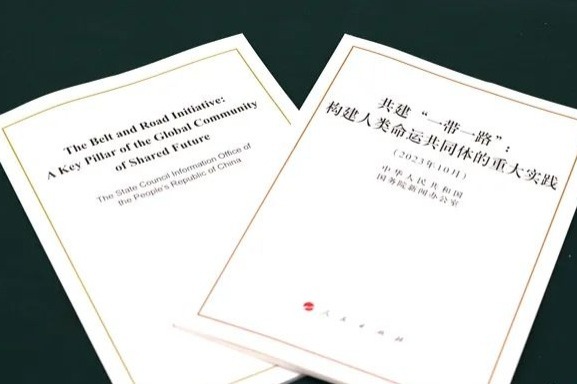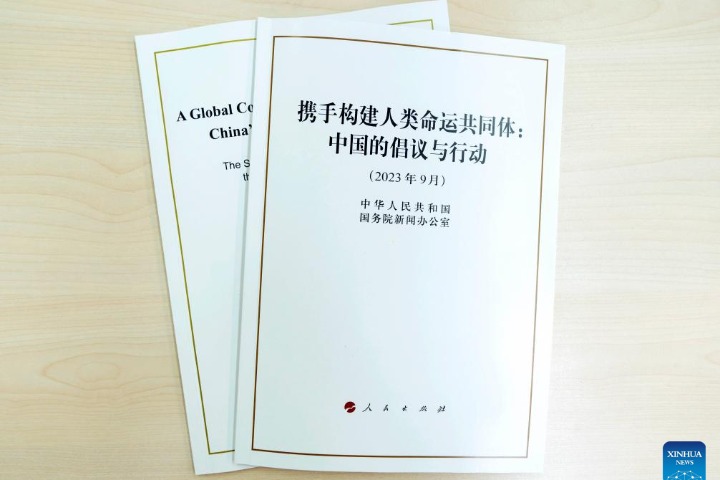2014联合国千年发展目标报告概要(双语)
联合国网站 2014-07-09 09:13

Substantial progress has been made in most areas, but much more effort is needed to reach the set targets
大多数领域已取得实质进展,但要实现既定的具体目标仍需更多的努力
•• Major trends that threaten environmental sustainability continue, but examples of successful global action exist
Global emissions of carbon dioxide (CO2) continued their upward trend and those in 2011 were almost 50 per cent above their 1990 level. Millions of hectares of forest are lost every year, many species are being driven closer to extinction and renewable water resources are becoming scarcer. At the same time, international action is on the verge of eliminating ozone-depleting substances and the proportion of terrestrial and coastal marine areas under protection has been increasing.
•• 环境可持续性继续受到严重威胁,但同时也存在全球行动的成功范例
全球二氧化碳排放继续呈上升趋势,2011年比1990年的水平高出近50%。每年丧失数百万公顷的森林,许多物种濒临灭亡,可再生的水资源也变得更为稀缺。但与此同时,国际社会采取行动几乎消除了消耗臭氧层物质,也使受保护的陆地和近岸海域得到了增加。
•• Hunger continues to decline, but immediate additional efforts are needed to reach the MDG target
The proportion of undernourished people in developing regions has decreased from 24 per cent in 1990–1992 to 14 per cent in 2011–2013. However, progress has slowed down in the past decade. Meeting the target of halving the percentage of people suffering from hunger by 2015 will require immediate additional effort, especially in countries which have made little headway.
•• 饥饿人数继续下降,但要实现千年发展目标的具体目标,仍需立即做出额外的努力
营养不足人口的比例已从1990-1992年的24%减少到2011-2013年的14%。但是,在过去十年中,进展放缓。要在2015年前实现将挨饿人口比例减半的目标,需要立即做出额外的努力,特别是在那些进展很小的国家。
•• Chronic undernutrition among young children declined, but one in four children is still affected
In 2012, a quarter of all children under the age of five years were estimated to be stunted—having inadequate height for their age. This represents a significant decline since 1990 when 40 per cent of young children were stunted. However, it is unacceptable that 162 million young children are still suffering from chronic undernutrition.
•• 长期营养不足的幼儿人数下降,但每四名儿童中仍有一名营养不足
2012年,所有5岁以下儿童中有四分之一发育受阻,达不到年龄应有的身高。尽管这比1990年的40%的幼儿发育受阻已有明显的下降,但仍有1.62亿幼儿还在经受长期的营养不足这一事实令人难以接受。
•• Child mortality has been almost halved, but more progress is needed
Worldwide, the mortality rate for children under age five dropped almost 50 per cent, from 90 deaths per 1,000 live births in 1990 to 48 in 2012. Preventable diseases are the main causes of under-five deaths and appropriate actions need to be taken to address them.
•• 儿童死亡率已几近减半,但仍需更多的进展
全球5岁以下儿童死亡率下降了几近50%,从1990年的每1 000例活产婴儿死亡90人下降到2012年的48人。可预防疾病是5岁以下儿童死亡的主要原因,需要采取妥善的行动来解决这些问题。
•• Much more needs to be done to reduce maternal mortality
Globally, the maternal mortality ratio dropped by 45 per cent between 1990 and 2013, from 380 to 210 deaths per 100,000 live births. Worldwide, almost 300,000 women died in 2013 from causes related to pregnancy and childbirth. Maternal death is mostly preventable and much more needs to be done to provide care to pregnant women.
•• 减少孕产妇死亡率仍需更多的努力
1990年至2013年期间,全球孕产妇死亡率降低了45%,从每10万活产婴儿死亡380名孕产妇减少到210名。2013年,全球将近30万女性因怀孕和分娩死亡。孕产妇死亡大多数是可以避免的,仍需加大努力为孕妇提供护理。
•• Antiretroviral therapy is saving lives and must be expanded further
Access to antiretroviral therapy (ART) for HIV-infected people has been increasing dramatically, with a total of 9.5 million people in developing regions receiving treatment in 2012. ART has saved 6.6 million lives since 1995. Expanding its coverage can save many more. In addition, knowledge about HIV among youth needs to be improved to stop the spread of the disease.
•• 抗逆转录病毒疗法挽救病人,一定要进一步扩大
接受抗逆转录病毒疗法的艾滋病毒感染者人数一直在大幅增加,2012年发展中地区共有950万人接受了这一治疗。自1995年以来,抗逆转录病毒疗法已挽救660万人的生命。扩大治疗范围可以挽救更多的人。此外,年轻人需要提高有关艾滋病毒方面的知识,以防止疾病的扩散。
•• Over a quarter of the world’s population has gained access to improved sanitation since 1990, yet a billion people still resorted to open defecation
Between 1990 and 2012, almost 2 billion people gained access to an improved sanitation facility. However, in 2012, 2.5 billion people did not use an improved sanitation facility and 1 billion people still resorted to open defecation, which poses a huge risk to communities that are often poor and vulnerable already. Much greater effort and investment will be needed to redress inadequate sanitation in the coming years.
•• 自1990年以来,全球有超过四分之一的人口获得了改善的卫生条件,但仍有10亿人露天便溺
1990年至2012年期间,有近20亿人使用了改善的卫生设施。但是,在2012年,仍有25亿人没有使用改善的卫生设施,其中10亿人仍露天便溺,这些都为贫困和弱势的社区带来了巨大的风险。今后需做出更大的努力和投入来解决卫生条件不足的问题。
•• 90 per cent of children in developing regions are attending primary school
The school enrolment rate in primary education in developing regions increased from 83 per cent to 90 per cent between 2000 and 2012. Most of the gains were achieved by 2007, after which progress stagnated. In 2012, 58 million children were out of school. High dropout rates remain a major impediment to universal primary education. An estimated 50 per cent of out-of-school children of primary school age live in conflict-affected areas.
•• 发展中地区90%的儿童就读小学
2000年至2012年期间,发展中地区小学入学率从83%增加到90%。大多数的成绩都是在2007年前取得的,之后进展停滞。2012年,有5 800万儿童失学。高辍学率是初等教育普及的主要障碍。约50%的小学失学适龄儿童居住在受冲突影响的地区。
The MDGs show that progress is possible, providing the platform for further action
千年发展目标显示进展是可能的,它为今后的行动提供了平台
The MDGs brought together governments, the international community, civil society and the private sector to achieve concrete goals for development and poverty eradication. Much has been accomplished through the concerted and focused efforts of all, saving and improving the lives of many people, but the agenda remains unfinished. The analysis presented in this report points to the importance of intensifying efforts to meet all MDG targets.
千年发展目标将政府、国际社会、民间团体和私营部门聚集起来以实现发展和消除贫困的目标。通过各方一致和集中的努力,许多具体目标已完成,挽救了很多人的生命,改善了很多人的生活,但目标议程仍未完成。本报告的分析展示出,有必要加大努力实现千年发展目标的全部具体目标。
The post-2015 development agenda is slated to carry on the work of the MDGs and integrate the social, economic and environmental dimensions of sustainable development. Continued progress towards the MDGs in the remaining year is essential to provide a solid foundation for the post-2015 development agenda.
2015年后的发展议程旨在继续千年发展目标方面的工作,并结合可持续发展的社会、经济和环境维度。今后一年,朝着千年发展目标的持续进展是十分必要的,这将为2015年后的发展议程奠定坚实的基础。
(来源:联合国网站,编辑 Helen)

















 英语点津微信
英语点津微信 双语小程序
双语小程序